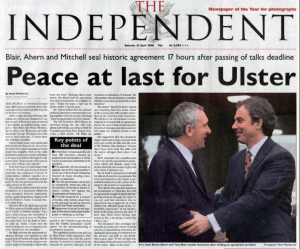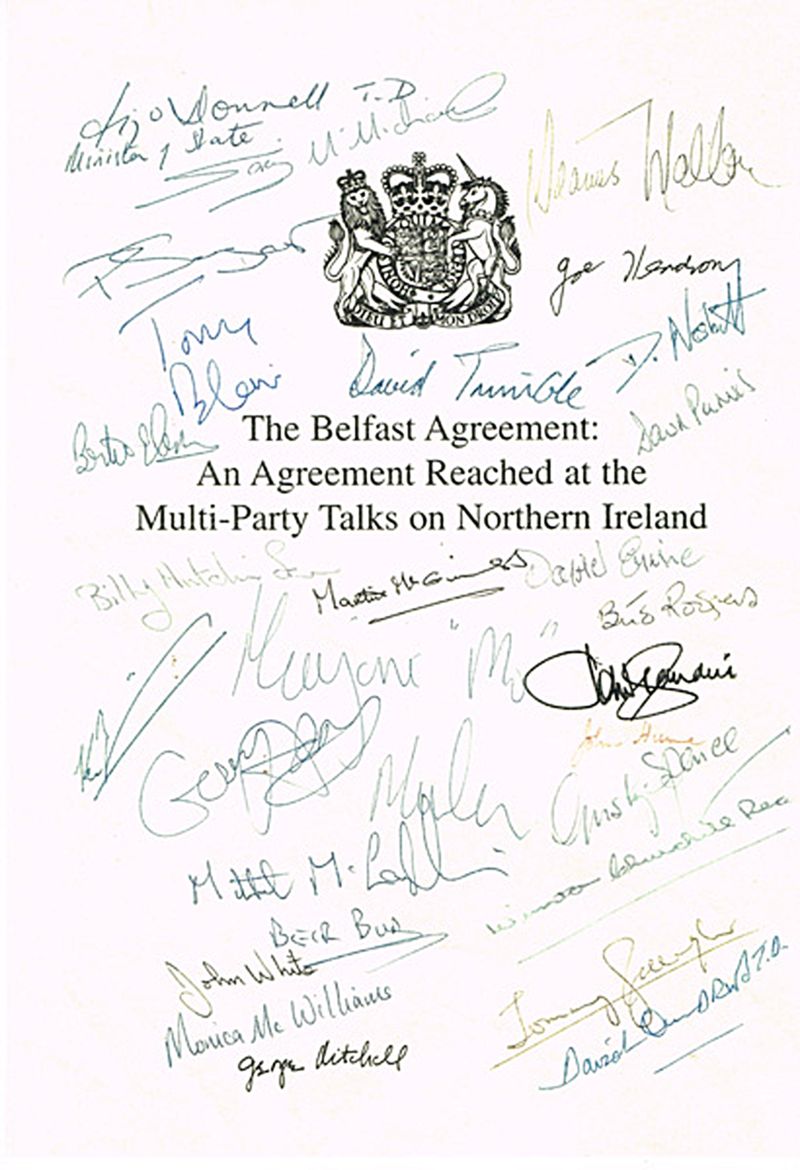
The Belfast Agreement being announced in an English newspaper. (The Independent)
Tony Blair, the Prime Minister of England, and Bertie Ahern, the Prime Minister of Ireland, signing the Belfast Agreement. (BBC)
Sinn Féin signed a pledge to follow the Mitchell Principles in September 1997 allowing them to join the all party Stormont talks. The Stormont talks were moved to the Lancaster House in London and known as the negotiations, with a goal of reaching an agreement. On March 25th, 1998, George Mitchell, who served as the chairman of the talks, set a two week deadline for negotiations.
After two years of negotiations and 30 years of conflict, US Senator George Mitchell announced the completion of the agreement. A copy of the text was mailed to every Northern Irish household. Polls in the Republic of Ireland, Northern Ireland and Britain show that the population tended to agree with the terms of agreement. 71.1% of the population voted for the Belfast Agreement referendum with only 28.9% voting against it.

The front cover of the Belfast Agreement, signed by all the participants of the talks.
"The Belfast Agreement covers 3 areas:
- the creation of a democratically elected Assembly
- the creation of a North/South Ministerial Council
- the creation of a British-Irish Council and the British-Irish Governmental Conference." (GOV.UK)
The Belfast Agreement states that " ... Northern Ireland in its entirety remains part of the United Kingdom and shall not cease to be so without the consent of a majority of the people of Northern Ireland voting in a poll held for the purposes of this section ... " (Belfast Agreement 1998). For the time being, Northern Ireland was still considered a part of England. Later in the section, it is explained that the Secretary of State will have the power to hold this poll seven years after the establishment of the agreement. With the option to leave England, most Nationalists were content. The Belfast Agreement also set up an assembly. This assembly is to be chosen by an election that would allow parties more seats if they had more of the percentage of the vote. "The Assembly - operating where appropriate on a cross-community basis - will be the prime source of authority in respect of all devolved responsibilities" (Belfast Agreement 1998). To ensure that the assembly represented the entire community of the island, participants must declare their political opinions.

The Belfast Agreement being announced in an English newspaper. (The Independent)
A North/South Ministerial Council was put in place to help with the inequality and oppression in Northern Ireland. The "cross-community" status of the assembly was declared to give both populations equal opportunity to have their voices heard in the government. The council will take care of executive decisions for the country. "All Council decisions to be by agreement between the two sides" (Belfast Agreement 1998). This helped level out power imbalances along with the human rights section which states that everyone has "the right to equal opportunity in all social and economic activity, regardless of class, creed, disability, gender or ethnicity" (Belfast Agreement 1998).
"A British-Irish Council (BIC) will be established under a new British- Irish Agreement to promote the harmonious and mutually beneficial development of the totality of relationships among the peoples of these islands." (Belfast Agreement 1998). This council is different from the others because it would include Scotland, Wales, Ireland, Northern Ireland and England. The BIC could talk about "transport links, agricultural issues, environmental issues, cultural issues, health issues, education issues and approaches to EU issues." (Belfast Agreement 1998). The BIC could, if they choose to, agree upon common policies. This helps solve the issue of community relations because it forces all the groups to actively communicate.
"... the British Government will make rapid progress with ... tackling the problems of a divided society and social cohesion in urban, rural and border areas ... measures on employment equality ... and covering the extension and strengthening of anti-discrimination legislation"
~ The Belfast Agreement of 1998

Tony Blair and George Mitchell shaking hands after the signing. (BBC)
"All participants accordingly reaffirm their commitment to the total disarmament of all paramilitary organisations" (Belfast Agreement 1998). Since the British Government and nationalist paramilitary groups were a part of the multi-party talks, they all agreed to begin decommissioning, under the Mitchell Principles, during the talks. "They also confirm their intention to continue to work constructively and in good faith with the Independent Commission, and to use any influence they may have, to achieve the decommissioning of all paramilitary arms within two years following endorsement in referendums North and South of the agreement and in the context of the implementation of the overall settlement ... The Independent Commission will monitor, review and verify progress on decommissioning of illegal arms, and will report to both Governments at regular intervals" (Belfast Agreement 1998).